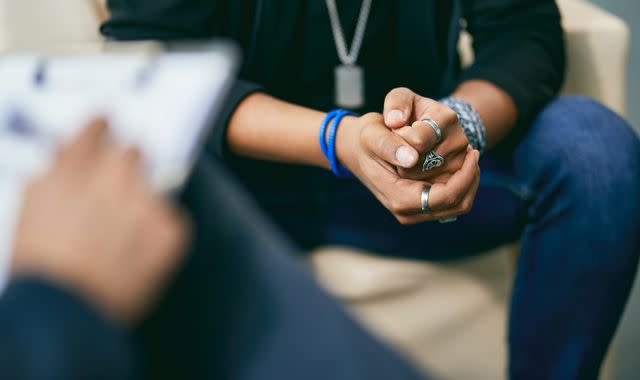Millions waiting nearly 10 years to be diagnosed with bipolar disorder, research finds

Millions of people with bipolar are waiting for an average of nearly 10 years to be diagnosed with the disorder, according to research.
Charity Bipolar UK, which conducted the research, warned that the delays are having a devastating impact on the lives of people with the condition and the quality of care they receive.
People living with bipolar have a suicide risk that is 20% higher than people without the condition and contributors to the Bipolar UK report say if their recommendations are implemented many lives will be saved.
Simon Kitchen, chief executive of Bipolar UK, said: "Leading experts around the UK are asking policymakers to act urgently, focussing on quicker diagnosis through specialist front-line medical training and easier access to consistent care for people with bipolar.
"There are currently not enough specialists in bipolar in the UK which means that symptoms are often being missed.
"People living with bipolar have a suicide risk that's 20 times higher than people without bipolar.
"Not only will these changes improve the quality of life for the million-plus people with bipolar in the UK, they will literally save lives."
Bipolar is a severe mental illness characterised by significant and sometimes extreme changes in mood and energy.
It was these extreme mood swings that made TV presenter Leah Charles-King repeatedly turn to her GP for help. But her doctor, she says, continually failed to recognise her condition, leaving her vulnerable and suicidal.
Ms Charles-King told Sky News she considered suicide on at least two occasions. During one breakdown the former R&B singer said she had to be talked down from the window of a high-rise tower by a close friend.
"In the end, I was so desperate that I wrote my GP a suicide note. And I brought it to the surgery because every time I'd gone before that and said 'help me, help me', it fell on deaf ears and I felt like this has to be the day because this is my last chance saloon," she said.
"And I remember I didn't have the energy that day to leave the house. I didn't have it in me, but I knew it was my last hope to get help that day."
Ms Charles-King started noticing changes in her mental health when she was in her late twenties. But it took almost another 10 years to be diagnosed.
"So every time I would go to my GP and I'd say 'this isn't right, I'm behaving like this. I'm acting like that. I'm putting myself in danger. I'm suicidal'.
"The answer just became, 'here's some antidepressants', and I kept being sent away with antidepressants, which actually is one of the worst things you could do. For someone who actually has bipolar because it can induce psychosis. It can accelerate a manic episode which could obviously put you in severe jeopardy."
But even after her bipolar was diagnosed, Ms Charles-King says the system of care and support for her and others like her is inadequate.
Read more on Sky News:
Calls grow for public inquiry into mental health care failings after three teenagers took their own lives
"When it comes to mental illness, there's no plan and there's no system and you're just left. So even once you do get a diagnosis, if you're lucky, you're then given tablets and you go back into society, you're left. Who knows if I'm taking these tablets?
"Even since being diagnosed and since getting help the amount of times I've presented myself to my GP as suicidal and have been sent home without help with a 'somebody will contact you'."
Bipolar UK says there are more than a million people with bipolar in the UK, 30% more than those with dementia and twice as many as those with schizophrenia.
Its report, which has taken 18 months to complete, recommends two changes to reduce diagnosis time and deliver greater continuity of care.
It wants bipolar screening across primary and secondary services to become routine when diagnosing mental health and the introduction of specialist training across the NHS to increase the accuracy of diagnosis.
The report's authors are also calling for the appointment of a new National Clinical Director of Mood Disorders who can guarantee everyone with bipolar access to a 12-week psychoeducation course and a clinician who specialises in bipolar to oversee all prescriptions, medication changes and ongoing care.
Bipolar UK says a reallocation of existing funding means no extra money would be needed to implement their recommendations.
Anyone feeling emotionally distressed or suicidal can call Samaritans for help on 116 123 or email jo@samaritans.org in the UK. In the US, call the Samaritans branch in your area or 1 (800) 273-TALK.

 Yahoo News
Yahoo News 
